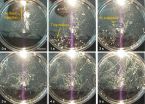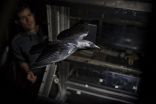Research reveals how the human brain might reconstruct past events
When someone tries to remember 1 aspect of an event, such as who they met yesterday, the representation of the entire event can be reactivated in the brain, including incidental information such as where they were and what they did
2015-07-02
(Press-News.org) When remembering something from our past, we often vividly re-experience the whole episode in which it occurred. New UCL research funded by the Medical Research Council and Wellcome Trust has now revealed how this might happen in the brain.
The study, published in Nature Communications, shows that when someone tries to remember one aspect of an event, such as who they met yesterday, the representation of the entire event can be reactivated in the brain, including incidental information such as where they were and what they did.
"When we recall a previous life event, we have the ability to re-immerse ourselves in the experience," explains lead author Dr Aidan Horner (UCL Institute of Cognitive Neuroscience). "We remember the room we were in, the music that was playing, the person we were talking to and what they were saying. When we first experience the event, all these distinct aspects are represented in different regions of the brain, yet we are still able to remember them all later on. It is the hippocampus that is critical to this process, associating all these different aspects so that the entire event can be retrieved."
The researchers showed that associations formed between the different aspects of an event allow one aspect to retrieve all the other aspects, a process known as 'pattern completion'. For example, when remembering who we saw, we often remember other details such as what they were holding and where they were. This means that the entire event can be re-experienced in full.
Using fMRI, the researchers showed that different aspects of an imagined event are reflected in activity in different regions of the brain. When asked about one aspect of an event, activity in the hippocampus correlates with reactivation in these regions, including those incidental to the task, and that this reactivation corresponds to the full event coming to mind.
"This work supports a long-standing computational model of how memory might work, in which the hippocampus enables different types of information to be bound together so that they can be imagined as a coherent event when we want to remember what happened," says senior author Professor Neil Burgess. "It provides a fundamental insight into our ability to recollect what has happened, and may help to understand how this process can go wrong in conditions such as Alzheimer's disease or post-traumatic stress disorder."
The experiment involved 26 volunteers, who were asked to imagine and memorise a series of 'events' involving different locations, famous people and objects. They were then asked to remember the details of the event based on a single cue. For example, one trial 'event' involved US President Barack Obama in a kitchen with a hammer. Volunteers were then asked to remember details based on a single cue, such as 'where was Obama?', 'who was in the kitchen?' or 'what object did Obama have?'. When asked to recall different aspects of events, volunteers underwent fMRI scans to measure their brain activity.
The results showed that different parts of the brain showed increased activity when encoding different aspects of each event, and that the hippocampus provides the critical links between them to form a complete memory. Using the previous example, activity increased in one part of the brain when volunteers thought of Obama, another when they thought of the kitchen and another when they thought of the hammer. The study showed that when asked 'where was Obama?' activity increased in the regions corresponding to Obama and Kitchen. Critically, activity also increased in the region corresponding to the hammer, despite no requirement to retrieve this item. This 'reactivation' correlated with hippocampal activity, suggesting the hippocampus is involved in retrieving the entire event.
The research is the first to provide evidence for this pattern completion process in the human hippocampus, and relate this to the everyday experience of recalling previous life events.
INFORMATION:
ELSE PRESS RELEASES FROM THIS DATE:
2015-07-02
Classical Brownian motion theory was established over one hundred year ago, describing the stochastic collision behaviors between surrounding molecules. Recently, researchers from Technical Institute of Physics and Chemistry, Chinese Academy of Sciences discovered that the self-powered liquid metal motors in millimeter scale demonstrated similar Brownian like motion behaviors in alkaline solution. And the force comes from the hydrogen gas stream generated at the interface between liquid metal motor and its contacting substrate bottom.
Ever since the irregular motions ...
2015-07-02
A group of the world's top doctors and scientists working in cardiology and preventive medicine have issued a call to action to tackle the global problem of deaths from non-communicable diseases (NCDs), such as heart problems, diabetes and cancer, through healthy lifestyle initiatives.
They say that identifying the enormous burden caused by NCDs is not enough and it is time for "all hands on deck" to pursue strategies both within and outside traditional healthcare systems that will succeed in promoting healthier lifestyles in order to prevent or delay health conditions ...
2015-07-02
Sophia Antipolis, 02 July 2015: Patients are experiencing significant delays in access to approved cardiovascular devices due to bureaucratic inefficiencies, reveals a Devices White Paper from the Cardiovascular Round Table (CRT) published today in European Heart Journal.1
There is a clear correlation between declining death rates from cardiovascular disease and the introduction of innovative techniques and devices.1
The CRT is an independent forum established by the European Society of Cardiology (ESC) and comprised of cardiologists and representatives of the pharmaceutical, ...
2015-07-02
Birds that moult at the wrong time of the year could be disadvantaged, according to a study by scientists at Lund University, Sweden. Birds depend on a full set of feathers for maximum efficiency when flying long distances, but the study shows that moulting has a detrimental effect on their flight performance.
The researchers trained a jackdaw to fly in a wind tunnel and measured different types of drag experienced by the bird. "We expected the bird not to be able to glide at the lowest speeds that it could glide at before moult and our results confirmed this", says ...
2015-07-02
Children with Attention Deficit Hyperactivity Disorder (ADHD) may be successfully supported in classrooms through strategies that do not involve drugs, new research has indicated. These children are typically restless, act without thinking and struggle to concentrate, which causes particular problems for them and for others in school.
A systematic review was led by the University of Exeter Medical School funded by NIHR's Health Research Technology Assessment programme and supported by the NIHR Collaboration for Leadership in Applied Health Research and Care South West ...
2015-07-02
Being able to dive is what matters most for seal pups, but how do they learn to do it? Grey seal pups that can play in pools may have better diving skills once they make the move to the sea, and this could increase their chance of survival. Researchers at Plymouth University have found that spending time in pools of water helps seal pups hold their breath for longer.
Many seal species stay on land after they have weaned before they go to sea to feed for the first time. "It is during this period of fasting that access to water can make a difference to diving ability," ...
2015-07-02
New guidelines for diagnosing chronic lung disease (chronic obstructive pulmonary disease or COPD), should be modified because they over-diagnose COPD in older men and under-diagnose COPD in young women.
Writing in The BMJ this week, Professor Martin Miller and Dr Mark Levy say up to 13% of people thought to have COPD under the new criteria have been found to be misdiagnosed.
They argue that clinicians should use internationally agreed standards when assessing patients for COPD. This, they say, will help to improve patient care through more accurate diagnosis, as well ...
2015-07-02
Evidence is lacking that having a category of drugs that can be sold only by pharmacists or under their supervision ("pharmacy medicines") has benefits, writes a pharmacy professor in The BMJ this week.
Professor Paul Rutter at the School of Pharmacy, University of Wolverhampton, calls for an end to pharmacists' monopoly on selling some drugs and thinks that a two tier system of prescription or non-prescription drugs, like in the US, would be simpler.
He mentions the recent case of the painkiller, oral diclofenac, that used to be available as a non-prescription drug ...
2015-07-02
Diabetes research is dominated by a small group of prolific authors, raising questions about the imbalance of power and conflict of interests in this field, argue experts in The BMJ this week.
In a new study, Frits Holleman and colleagues searched PubMed for all randomised controlled studies (RCTs) on glucose lowering treatments for diabetes from 1993 to 2013.
In total, they identified 3,782 articles with 13,592 authors.
The top 110 authors were named in a third (32.4%) of all articles, and they authored 991 RCTs, equivalent to 20 RCTs per author.
Of these 110 ...
2015-07-02
Philadelphia -- Elias S. Siraj, M.D., FACP, FACE, director of the Diabetes Program at Temple University Hospital (TUH), and Kevin J. Williams, M.D., FACP, chief of endocrinology, diabetes and metabolism at TUH, co-authored an editorial piece published July 2 in the New England Journal of Medicine about a major weight loss study involving obese and overweight patients.
Siraj and Williams offered their take on the significance of the randomized, double-blind clinical trial that showed a daily injection of 3.0 mg of the drug liraglutide, when given as an adjunct to diet ...
LAST 30 PRESS RELEASES:
[Press-News.org] Research reveals how the human brain might reconstruct past events
When someone tries to remember 1 aspect of an event, such as who they met yesterday, the representation of the entire event can be reactivated in the brain, including incidental information such as where they were and what they did


